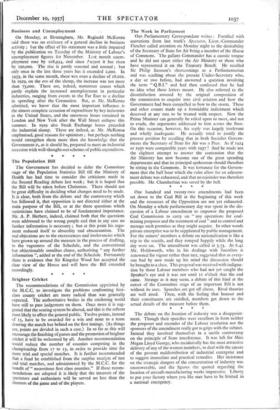The Week in Parliament Our. Parliamentary Correspondent writes,: Fortified with
quotations from _last week's Spectator, Lieut.-Commander Fletcher called attention on Monday night to the desirability of the Secretary of State for Air being a member of the House of Commons. The gallant Commander has a caustic tongue and he did not spare either the . Air Ministry or those who have represented it on the Treasury Bench. He recalled Sir Philip Sassoon's shortcomings as a Parliamentarian and was scathing about the present Under-Secretary who, a day or two before, had answered a question involving the term " Q.B.I." and had then confessed that he had no idea what these letters meant. He also referred to the dissatisfaction aroused by the original composition of the commission to enquire into civil aviation and how the Government had been compelled to bow to the storm. These and other counts made up a formidable indictment which deserved at any rate to be treated with respect. Now the Prime Minister can generally be relied upon to meet, and not- to evade, the arguments addressed to him across the floor. On this occasion, however, his reply was largely irrelevant and wholly inadequate. He actually tried to justify the present position by recalling that in both Socialist Govern- ments the Secretary of State for Air was a Peer. As if 1924 or 1930 were comparable years with 1937! And he made not the slightest attempt to answer the contention that the Air Ministry has now become one of the great spending departments and that its principal spokesman should therefore be sitting in the Commons. It was fortunate for the Govern- ment that the half hour which the rules allow for an adjourn- ment debate was exhausted, and that no rejoinder was therefore possible. Mr. Chamberlain was saved by the bell. * * * *






















































 Previous page
Previous page